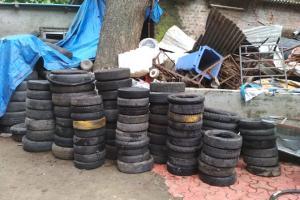BMC has removed as many as 8729 tires in the last six-and-a-half month which turn into breeding grounds for mosquitoes in order to stop the spreading of water-borne diseases.

In an attempt to stop the spreading of water-borne diseases, BMC has removed as many as 8729 tires in the last six-and-a-half month which turn into breeding grounds for mosquitoes. Along with that other item like bottle lid, tire, thermocol, coconut shells, air-conditioning system, refrigerator defrost tray, empty toilets, ropes under rope wells are also being removed to curb the menace of mosquitoes in the on-going monsoon season.
ADVERTISEMENT
The pesticide department of the municipality regularly inspects places across the city to find and remove tires and other items which hold water. Accordingly, during the last six-and-a-half months, the corporation has removed as many as 8,729 tires. While the highest number of tires have been removed from the 'F South' section of the municipality. This is followed by M East, and K East where the largest number of tires have has been recovered.
Also, 2,84,139 other utensils have been recovered which turn into breeding grounds during monsoon. The highest number of breeding appliances have been discovered from E ward (51,534) followed by R (middle) with 23,990 and 22,378 in A ward.
The Aedes aegypti, the yellow fever mosquito, is a mosquito that can spread dengue fever, chikungunya, originates in clean stored water. In the case of malaria, the Plasmodium Species (Anopheles Stephensi) mosquitoes also originate in clean water. Rajan Naringrekar, BMC insecticide office said, "Citizens should also assist the municipal pesticide department with all necessary care regarding mosquito breeding."
Mosquito-borne diseases such as malaria, zika, chikungunya and dengue are prevalent during the monsoon season
Catch up on all the latest Crime, National, International and Hatke news here. Also, download the new mid-day Android and iOS apps to get the latest updates
 Subscribe today by clicking the link and stay updated with the latest news!" Click here!
Subscribe today by clicking the link and stay updated with the latest news!" Click here!






